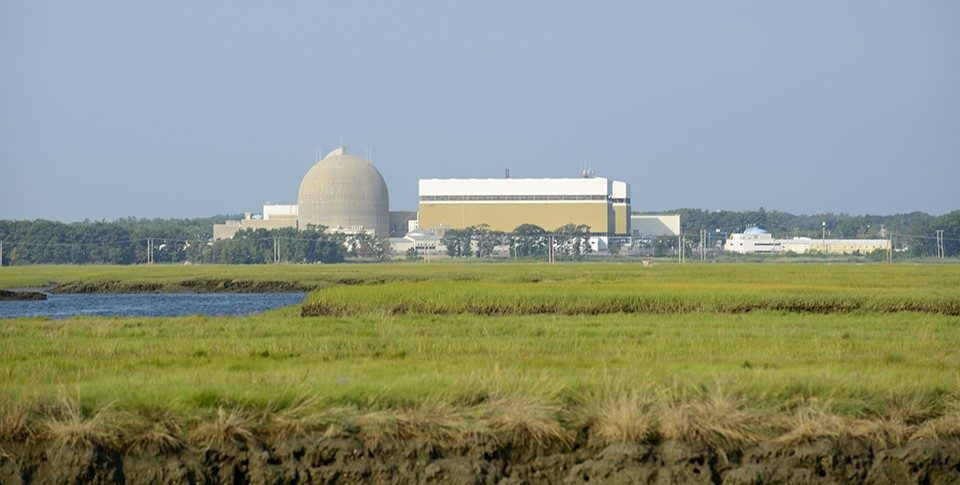REGIONAL — NextEra Energy, owner of the Seabrook Station nuclear power plant, offered last week to conduct a demonstration of its proposed new emergency response program to prove to the Nuclear Regulatory Commission (NRC) that its plans for reducing its emergency staff from 47 to 37 people would not jeopardize plant safety.
In a public hearing about the proposed changes in the plant’s emergency management, New Hampshire Executive Councilor Janet Stevens told the NRC hearing officers that Seabrook did not need a new drill. Seabrook had a demonstration of its emergency management when 10 of the plant’s 120 alarms were sounded in July 2022, although there was no emergency, she said.
According to a follow-up report of the false alarm, the plant failed to respond adequately, officials concluded. Critics of the plant called it a “fiasco.”
The staff at Seabrook Station took more than an hour to notify the New Hampshire emergency management office and local law enforcement that it was a false alarm.
No one was even answering the phone at the plant, critics said.
Under the proposed changes at Seabrook, the emergency response staff would be reduced by 32 percent from 47 to 34 operators. Federal regulations require that Seabrook have 37 trained emergency response operators, which is one reason NextEra is required to seek an amendment to its license.
The proposal would also allow the required response time to increase from 60 to 90 minutes for 12 of the staff. It would cut the number of radiation technicians from two to one and eliminate other emergency response roles.
And the plan, which NextEra said would benefit it and the nuclear power industry, proposes to staff the emergency response positions with employees that have less than the now required 6,000 hours of experience and would not have to be certified as health physicists, according to Sarah Abramson, executive director of the Seabrook watchdog organization, C-10 Research and Education Foundation in Amesbury.
“It makes no sense to reduce radiation protection staff,” Abramson said. ”In an emergency, every minute counts.”
NextEra’s Communication Strategist Lindsay Robertson responded: “The top priority of NextEra Energy’s fleet common emergency plan is protection of public health and safety, which will not be compromised. The changes we have proposed do not alter the number of full-time employees at our company’s nuclear facilities.
“All employees at the company’s nuclear facilities play an emergency response role. The company will always ensure its facilities have appropriate staffing in everyday operations and in an emergency situation.”
C-10’s Abramson said she is “cautiously optimistic” after the public hearing last week that the NRC will hold NextEra accountable for maintaining its safety program.
Abramson voiced concern that the NRC has not mentioned during the License Amendment review that Seabrook Station has a “concrete cancer,” caused by an alkali-silica reaction. The alkali-silica reaction, caused when concrete is exposed to water, is believed to be undermining the structural integrity of the 34-year-old plant.
The most likely scenario for an emergency, Abramson said, would be caused by a storm that floods the plant or terrorists that attack it.
“In just the last 3 months we have seen three historic flooding events, making the only roads into and out of coastal towns like Hampton, Salisbury, and Plum Island completely unusable should there be an evacuation order stemming from an emergency at the plant,” Abramson wrote.
Severe weather is also putting stress on the old plant, she wrote.
At the hearing Stevens joined C-10 in noting how badly the station performed in an emergency when the 30-year-old alarms sounded on Hampton beach.
Seabrook officials said the investigation found that there was nothing wrong with the sirens, but human error led to “an inadvertent activation of a command within the system.”
As a result, Seabrook added a new procedure that sends information simultaneously to local law enforcement.
“We have put in place processes that notification will go out uniformly to all the agencies that need to notify the public,” Seabrook Station spokesman Bill Orlove was quoted. “I think it’s important to clarify that in case of an emergency, Seabrook has to provide timely and accurate information to our partners, mostly our state partners, that then notify the public.”
Over the past 30 years, the nuclear plant has held silent alarm tests every two weeks. Officials said staff members who perform the testing will undergo additional training, extra personnel will be added and pre-programmed commands will be removed from the test system.
Nuke Agency Studies Seabrook’s Emergency Plan Changes
Tuesday March 26, 2024

Seabrook Nuclear from Next Era Energy


